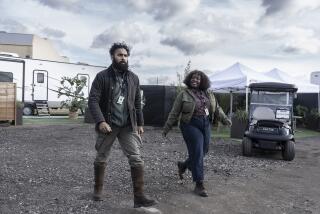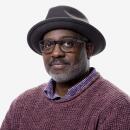Garth Ennis says superheroes ruined comics. With ‘The Boys,’ he’s fighting back
- Share via
The tone of “The Boys” is set from the start: Its inciting incident is a person being run through at super speed, exploding in a mass of body parts and blood.
The subversive Amazon series, adapted from the comic book created by Garth Ennis and Darick Robertson, lives at the intersection of power (corporate and supernatural), celebrity and media: Its heroes are regular people, on a mission to take down and expose the truth about The Seven, a group of corporate-sponsored, spotlight-hungry superheroes, and Vought, the multibillion-dollar conglomerate that manages them and covers up their dirty secrets.
In other words, “The Boys” — whose sprawling ensemble cast includes Karl Urban, Jack Quaid, Antony Starr, Erin Moriarty, Laz Alonso, Chace Crawford, Tomer Capon, Karen Fukuhara, Jessie T. Usher and Elisabeth Shue — deconstructs the superhero tales that now dominate the entertainment landscape. And it’s not alone: The genre has been turned on its ear as projects with darker, more serious themes have arrived to counter the brighter tales of heroes like Supergirl and Captain America. Marvel’s Netflix duo “The Punisher” and “Jessica Jones,” AMC’s “Preacher,” HBO’s upcoming “Watchmen” and films like “Brightburn” reimagine and redefine superheroes as angsty, alcoholic, egomaniacal or any other number of very human traits considered undesirable in polite society.
Ennis, who wrote the comic book in a “grim time of bad men and their doings,” doesn’t mince words when it comes to the now-ubiquitous superhero genre and the question of whether we’ve reached a point of too many capes onscreen.
“There’s apparently no end in sight to the saturation of film and TV by superheroes,” Ennis wrote in an email. “They seem to be the perfect fantasy of hope and empowerment for a world that increasingly lacks either. Personally, not having grown up with superheroes, I find them completely moronic.
“Bush and Cheney had just been returned to power, the Iraq bloodbath was boiling away, and Hurricane Katrina had devastated New Orleans,” he continued, referring to the comic’s 2006-2008 run. “So I was writing about corporate corruption of government, abuse of power and abandonment of ordinary people. In terms of fiction, the kinds of protagonists we had at the time were Tony Soprano and Vic Mackey — bad men guiding us around a bad world.”
And that’s how “The Boys” was born.
Showrunner Eric Kripke, who serves as executive producer alongside Point Grey Pictures’ Seth Rogen, Evan Goldberg and James Weaver — the team behind AMC’s ultra-violent “Preacher,” also based on an Ennis comic — saw how Ennis shaped the world and wanted to make sure the show was as close to that as possible.
“I’m just doing my best to reflect the tone that Garth Ennis created. He’s a master at mixing hardcore violence with absurd humor with political commentary, and I’m just trying to match that,” said Kripke. “We’re depicting how we feel real humans would behave if they had the power: They would abuse it.”
Kripke is mindful of the backlash that appears to be growing among some moviegoers — despite “Avengers: Endgame” recently becoming the highest-grossing movie of all time. There have been allegations of superhero fatigue, of it being a genre of the moment (à la westerns) and a diversity ploy. The conversations have generated multiple Reddit threads by fans discussing the criticism and future of superheroes onscreen. Even stars such as Jodie Foster and Simon Pegg believe the genre is harmful to the industry. Grumbling aside, though, Kripke still feels that his show is exactly where it should be.
“In any massive cultural movement, the next wave of people will start examining it and deconstructing it. It’s kind of human nature,” Kripke said. “The thing it reminds me of is the western. For a couple of decades the western was a huge genre. Eventually it’ll fade, because every genre has to. But it’s going to be a while.”
“The Boys” actress Erin Moriarty, who plays Starlight, a super-powered hero with (so far) a good heart, was never particularly a fan of the superhero genre, but she recognizes the tonal shift and relishes being able to tell more grounded stories.
“The backdrop always involved superheroes in a world alternate to our own reality,” she said. “I think that the art we pump out tends to reflect the state of the world. At least in terms of ‘The Boys,’ we’re trying to handle some topical issues right now, so that lends itself to an inevitable darkness.”
One of those issues is women being represented in the genre. Films and TV series like the now-canceled “Jessica Jones” — which Moriarty was also a part of — “Captain Marvel” and the recently announced “Black Widow” put women front and center in the genre. Moriarty knows that her current show, despite its title, does the same, deconstructing the “boys club” superhero mythology. How many Batman, Spider-Man and Superman reboots had to happen before there was a “Wonder Woman” film, despite the character being just as revered and established?
“There’s an irony to ‘The Boys’ in that, even though it has that name, there are some really kick-ass women that ultimately end up being some of the strongest characters on the show. And then in ‘Jessica Jones’ ... it kind of was breaking the mold by having this female, complicated, multifaceted alcoholic but really strong superhero as the lead.”
In going back to the origins of darker characters in comic books, the Punisher may have the most recognizable symbol: a white skull on a black background. Ennis wrote the Punisher comics for a stint, and it’s considered one of that book’s best runs. Current writer Matthew Rosenberg is a fan of Ennis’ run, and knew what the Punisher was when he took on the job.
“There is no debating whether Frank Castle is a good guy or a hero. He isn’t. And Ennis does a great job of making you root for him and then scolding you for doing it,” Rosenberg wrote in an email. But he also resists violence for violence’s sake.
“I always want to have a moral true north somewhere. It’s easy to get lost in the world of ‘bad people doing bad things to other bad people.’ I think a lot of writers and readers can find themselves rooting for things they shouldn’t be rooting for. And that’s fun for a while, but in the end it’s cheap and it’s a little dangerous.”
Kripke agrees, and knows that the thrills that fans may clamor for must be rooted in story.
“The danger for a subversive and outrageous tone is that you become gratuitous — or that you become shocking for shock’s sake,” said Kripke. “We can have totally insane moments, but we have to be able to justify it.”
Though there may be a line that can’t be crossed, “The Boys,” which often uses crude comedy to attempt levity in tense situations, still makes some choices that could be considered questionable.
“We aim to put something crazy or visually insane in every episode. There’s explosive eviscerations. There’s dolphin erotica. There’s fatal sex. There’s using children as murder weapons,” said Kripke. But whatever theatrics or moral line-toeing, the showrunner says the show will stay true to Ennis’ vision.
“I read Garth Ennis and Neil Gaiman. Those were the guys I was obsessed with,” Kripke continued. “Both the comic and the show are about how completely ridiculous celebrity culture is. It’s also about how completely ridiculous and corrupt politics are, and media, and how the worst of it all is when they combine into one thing. And Garth was writing about that in 2006 and 2007. The [real] world has come to reflect the world of ‘The Boys’ more than it ever has.”
Ennis is not as defiant as Alan Moore of “Watchmen,” in terms of having his work translated, but if he’s happy about another of his properties becoming a TV series, you’d never know it. He, like “The Boys,” swims against a current of superhero popularity that may or may not have reached its crest.
“The appeal for me is that I can write about life as I find it, rather than idealized fantasy figures that bear no relation to reality,” said Ennis. “The notion that the medium I work in is dominated (and, sadly, defined) by such a stupid genre is not one that feeds my sense of idealism. They’ve ruined comics, so there’s no reason they can’t ruin film and TV as well.”
‘The Boys’
Where: Amazon Prime
When: Anytime
Rating: TV-MA (may be unsuitable for children under the age of 17)
More to Read
The complete guide to home viewing
Get Screen Gab for everything about the TV shows and streaming movies everyone’s talking about.
You may occasionally receive promotional content from the Los Angeles Times.







